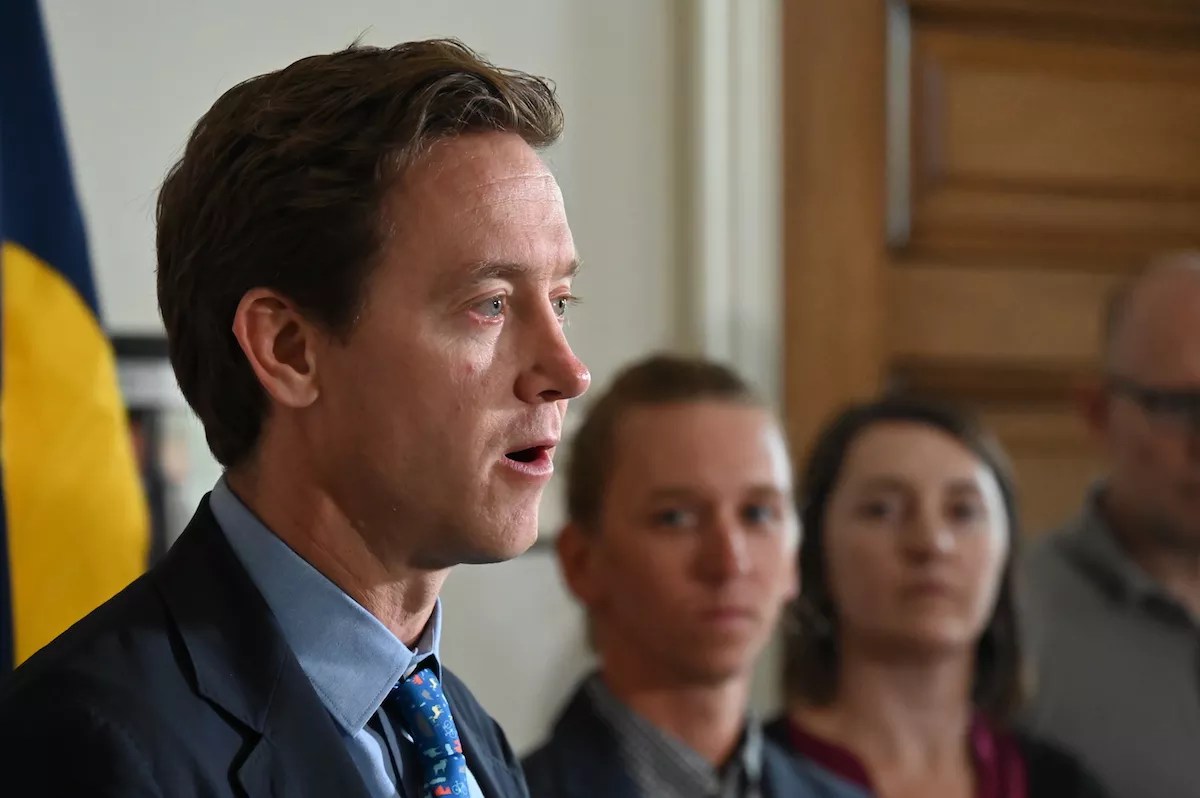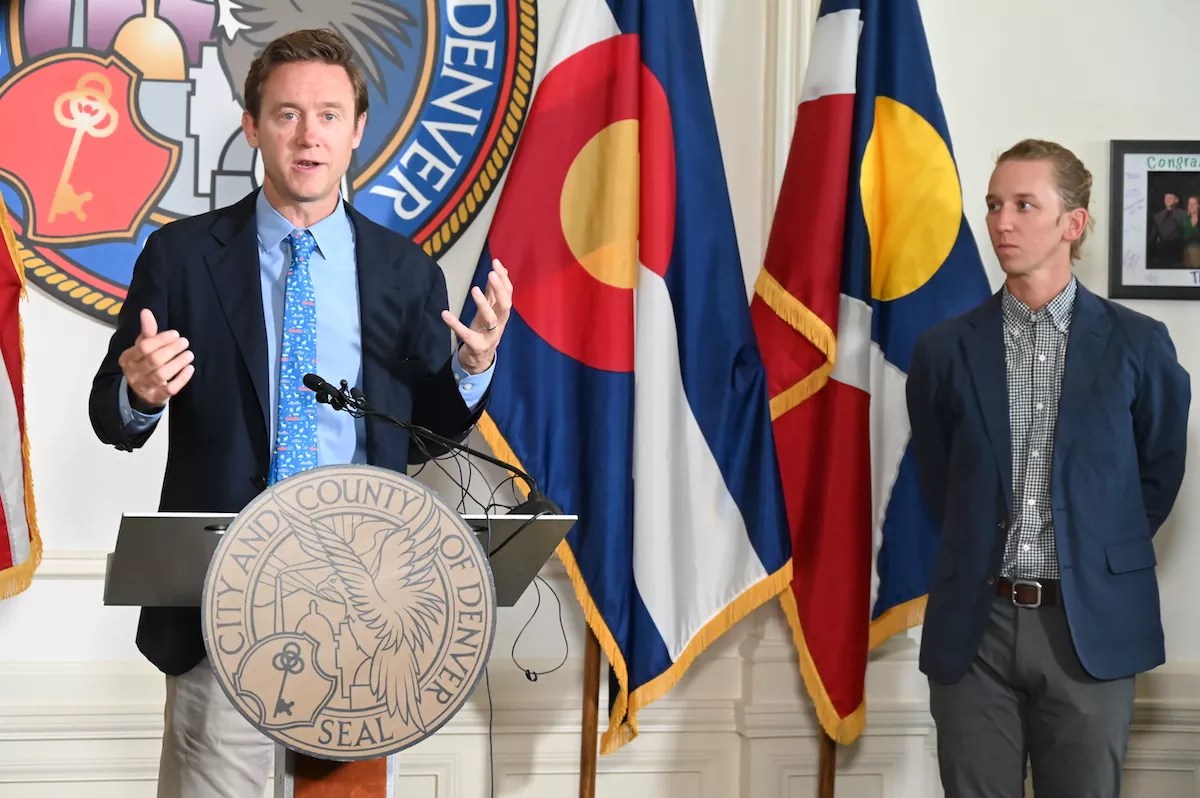
Bennito L. Kelty

Audio By Carbonatix
A week after he declared a citywide state of emergency to tackle homelessness, Mayor Mike Johnston has started to pull back the curtain on his plans for sheltering more than 1,000 people “living and dying on the streets” by the end of the calendar year.
At a press conference on Tuesday, July 25, Johnston said that he’ll be putting unsheltered homeless people in four different kinds of residences: existing units, converted hotel rooms, micro-communities and converted commercial buildings. To do so, he plans to partner with housing agencies across the city to get at least 1,000 individuals under a roof by 2024, according to Denver’s new mayor.
However, Johnston didn’t mention which groups he’s recruited to help.
Currently, the Colorado Coalition for the Homeless is the only agency that the city has acknowledged having talks with. Johnston detailed CCH’s role in his emergency effort at the announcement, saying it was one of several nonprofit organizations that will “help do anything – from shelter work to current supportive housing to nonprofit support to community outreach.”
The city will ultimately try “matching people with housing units” as it clears individuals off the streets, he says, but many will be able to go immediately to available units that the city or its housing partners already own. Johnston referred to these residences as “existing units” and “rental units that would be available somewhere in the city,” where people will be able to move in right away with a lease.
The units would also also come with wrap-around services, including a case manager to help people stay housed, while also being “scattered,” Johnston said, so that people moving into them live apart from each other. Getting placed in a converted hotel room – possibly with a kitchenette – will also be an option.
Such accommodations can be life-changing, Johnston noted: “Those offer real benefits in multiple ways. One is that some have kitchenettes included. That means you have a complete micro-unit. You have a locked door, you have a bathroom, you have showers, you have a kitchen, you have a bed.”
Hotel conversions would be done in “places that are hotels that we can either use or acquire…for housing locations,” the mayor said. Prior to his election, Denver City Council had already signed contracts with CCH to operate converted hotels – including the former La Quinta Inn at 3500 Park Avenue West – as well as to renovate other properties, such as the Denver Clarion Hotel.
City officials will also try to put people in micro-communities that would basically be safe outdoor spaces, likely on vacant land, Johnston said. Or they may end up in converted commercial buildings that will be used as non-congregate shelter sites, where people can have “their own individualized room.”
The converted commercial buildings “could be anything from old, unused elementary schools, old churches – it could be commercial warehouses,” according to Johnston. “Places where we think we can have some combination of capacity for either individualized housing or congregate housing,” he said.
Construction, labor and utility leaders have been working with Denver officials to “help prepare these sites,” Johnston noted. The city is also communicating with “faith leaders in the community to see how they can be part of this long-term solution.”
To fund this ambitious project, Johnston said that he’s pursuing “an all-of-the-above strategy,” which is the same tactic he’s using to decide where to put people. The funding will draw from state and federal dollars.
“We are looking at the current city budget aligned to our [Housing Stability] department,” Johnston said. “We will be submitting a number of grant applications to the state this week. Some of the [American Rescue Plan] dollars that are left over as well as the Prop. 123 dollars, which we just opted into this week.”
Proposition 123, a ballot measure that Johnston pushed and Colorado voters approved last November, will put as much as $300 million annually in state income tax revenue toward affordable-housing projects.

Mayor Mike Johnston stands with his new senior advisor on homeless resolution, Cole Chandler, who will help him shelter 1,000 people by 2024.
Bennito L. Kelty
Sweeps of encampments that move large groups of homeless people off the street have been a regular occurrence over the years. At a town hall meeting later on Tuesday at the Savoy Denver, Johnston said that “sweeps will continue where there are public health risks,” but that the city will “conduct them in a way that is respectful, dignified and that is thorough.”
The problem with the existing sweeps and the city’s current camping ban, he added, is that people will often keep returning to the streets. “If you tell people with no place to go to pack up and leave, they’ll just come back,” Johnston said.
He said that he intends to try “decommissioning” encampments in the future, so that people don’t erect more. In the meantime, Johnston wants the city to start finding adequate housing for homeless people living in the encampments so that they can be relocated.
“The reason why it’s very different is the old camping ban enforcement was people are living on the block, you don’t want them living there, so you force them to move,” Johnston had explained at his press conference earlier that day. “The difference here is we are waiting to bring housing units on; when housing units are available, then we come onto encampments and we now have housing units to move you to.”
The mayor said he’s confident that nearly everyone living on the street who gets offered housing will accept, based on surveys that show as many as 90 percent of homeless people would take the offer if it were given to them. Any holdouts who choose to stay on the street would be helped with services, according to Johnston.
To deal with its new slate of actions regarding homelessness, the City of Denver opened its emergency center on July 24; more than fifty city employees are working there. Johnston said he visited the center on its first day and saw “very productive conversations happening across all agencies and departments to figure out how we can take on these challenges in a coordinated way.”
The job of city employees working at the center is “to plan what we need to bring folks into housing,” Johnston explained.
City officials learned earlier this week that metro Denver’s homeless population had increased by about 32 percent this year compared to 2022, according to the newest data from the Point in Time count, a federally funded annual survey of how many people are experiencing homelessness during a single night in January.
The new count showed an 8 percent increase in Denver’s unsheltered population, with 1,313 people reported as living on the streets in 2022, but the 2023 count found about 2,800 unsheltered homeless. The total number of homeless in Denver, including people in shelters, is now estimated at 9,000 people.
“The count continues to go up – not as much as the nearly 33 percent increase we saw the year before – and so the crisis continues, and it’s expanding,” Johnston said. “That’s one of the reasons why we think there’s a real reason for action.”
The mayor has appointed nine of the ten committee members who will lead his homeless resolution plan. Joining Johnston at the press conference was Cole Chandler, a rising star in homelessness policy, who will be his senior emergency advisor. The mayor snagged Chandler from the Colorado Department of Human Services, where he worked for less than a year as the state’s first director of homeless initiatives. Chandler also worked for five years as the executive director of the Colorado Village Collaborative, an early homeless resolution program in Denver; he left the CVC last year for his job with the state.
Chandler will lead Johnston’s Homeless Resolution Team, on which he’ll be joined by Joshua Posner, director of strategic initiatives and former director of finance for Johnston’s mayoral campaign. Posner “helped pass Proposition 123,” according to Johnston’s office, as a member of Gary Community Ventures – a Denver foundation focused on policy and philanthropy that affects kids and families.
Johnston’s other committee appointees include Milagros Barsallo, co-founder and CEO of RISE Colorado – an Aurora nonprofit dedicated to education – as the director of public engagement; Perla Bustillos Gutierrez and Sterling Loza as deputy directors of public engagement; Tony Lucero and Fatimah Ben Masaud as project managers; and Stephen Padilla and Sterling Simms, who will help with grants and team operations.
Johnston plans to appoint at least one more person to the team, but hasn’t described what role that member will have. His emergency declaration last week also promised a traveling town hall tour of all 78 Denver neighborhoods, with “all City Council members” meeting with residents, visiting potential sites and working with communities to “build trust and source feedback throughout the city.”
That tour launched on July 25 with the meeting at the Savoy in Five Points.